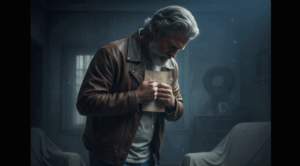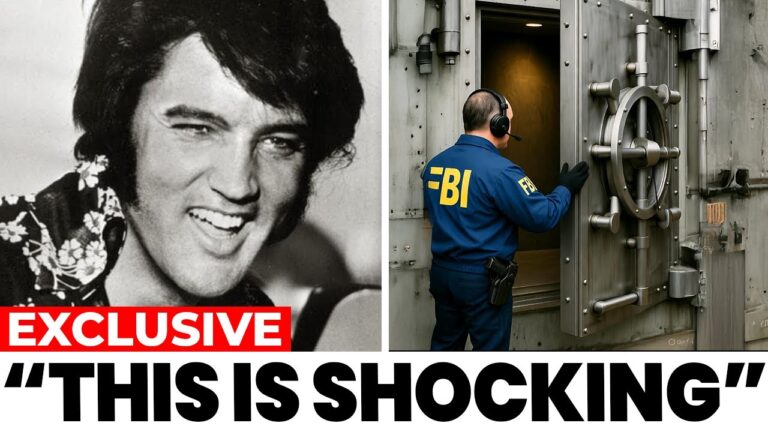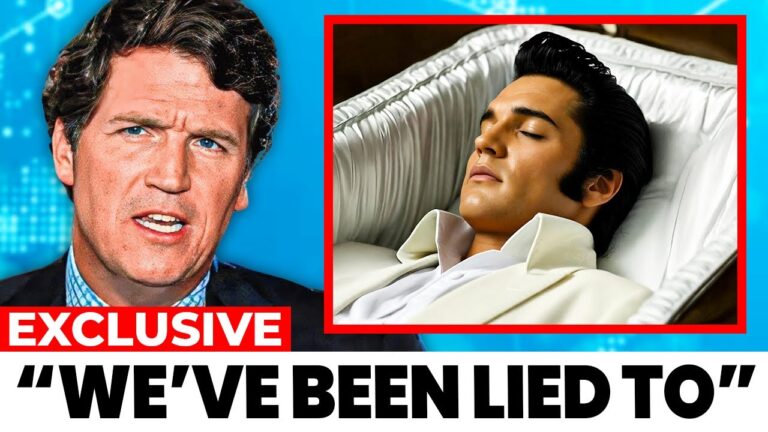The late afternoon sun spilled across the highway, turning the asphalt into a river of gold. The deep rumble of an old Harley Davidson echoed through the empty fields. On the seat sat a silver-haired man in his sixties. His leather jacket was worn thin at the shoulders, the faded patch on the back a relic of a biker club long gone. His name was Ray Collins, sixty years old, a drifter who had spent his life on the road.
In the pocket of his jacket lay a folded letter, the paper yellowed with time. Ray had read it dozens of times, but the weight in his chest never grew lighter.
“Ray, your parents are gone. The old house is yours now. If you want to come back, it’s waiting. If not, it will remain empty forever.”
The words cut like a blade. Forty-two years earlier, Ray had stormed out of his hometown after a furious fight with his father. His father, a stern man of few words, had never hugged him, never praised him. In Ray’s memory, there was only anger, harsh commands, and eyes heavy with disappointment.
At eighteen, in a blaze of rage, Ray had shouted:
— If you hate me that much, I’ll leave. And I’ll never come back!
He had slung a duffel bag over his shoulder, jumped on the cheap motorcycle he’d just bought, and roared into the night. The door had slammed behind him, his mother’s sobs muffled by the walls. He never turned back.
Now, decades later, the road home stretched before him.
The fields had changed into housing blocks, the roadside bar he once sneaked drinks in was now a supermarket. But some things never changed: the line of trees along the highway, the winding road into town, and the tightness in his chest as he thought of the old house.
Ray slowed down, the engine’s heavy pulse matching his heartbeat. Every mile dragged old memories to the surface.
He remembered riding on the back of his father’s bicycle as a boy, tiny arms wrapped around a waist hard as iron. His father pedaled slowly, never looking back, only muttering in a low voice:
— Hold on tight.
At fifteen, Ray had fallen in love with rock music. He scraped enough money to buy a battered guitar, practicing chords every night. His father had forbidden it, insisting he work in the garage. “Music won’t fill your stomach,” he’d bark, fist slamming on the table.
The gap between them widened with each year, until it burst open that final night.
— If you walk out that door, don’t you ever come back!
And Ray had left, blinded by anger, deaf to his mother’s desperate cries:
— Ray, please… don’t go…
For forty years, Ray wandered. He joined biker gangs, fought in roadside bars, fell in love with a woman he couldn’t keep, drank himself unconscious under bridges. He’d been jailed for brawls, buried brothers lost to accidents, and chased freedom across endless highways. But never once did he ride back to his hometown.
Until now.
The house stood at the edge of town, quiet as a grave. The wooden porch sagged, the front door warped with rot. Ivy strangled the roof. Ray cut the engine, and silence swallowed him whole.
He stepped onto the porch, hand trembling as he pushed the door open. The hinges groaned. Inside, dust covered everything. The living room was just as he remembered: the heavy oak table, the iron stove, and above the mantel, the family portrait.
His father stood stiff, a soldier’s stance. His mother’s gentle smile rested on his shoulder. And there he was, a boy of sixteen, eyes burning with restless fire.
Ray reached up, brushing away dust from the glass. For a heartbeat, he swore they were all looking back at him.
He climbed the stairs. On his bedroom door, faded marker still read: “Ray’s Room – Keep Out!” He let out a dry chuckle and pushed the door open.
The room was frozen in time: the sagging bed, the cluttered desk, the shelf of forgotten books. In the desk drawer, he found a bundle of letters tied with ribbon. On the outside, in his mother’s handwriting: “To Ray.”
His hands shook as he opened the first one.

“Ray, my son… Your father watches over you, even if he doesn’t show it. He is proud of you, though he’ll never say the words. Every night he sits on the porch, staring down the road you took, waiting for you to return…”
Tears blurred Ray’s vision. He read on, letter after letter, his mother’s words trying to bridge the silence.
And then, tucked in the pile, a will. His father’s handwriting, blunt but deliberate.
“For Ray — so he can start over, if he ever comes back.”
Ray’s breath caught. He had spent a lifetime believing his father despised him. But the truth was different. His father had loved him the only way he knew: through discipline, through stern silence, through sacrifice. His father had been a war veteran, broken by battles that scarred his soul. He had no words for tenderness, only commands and anger.
And Ray, too young and too proud, had never understood.
That night, Ray sat on the porch with a bottle of whiskey. The moonlight spread silver over the yard, the air thick with crickets and wind. He spoke to the empty night, voice raw:
— Dad… Mom… I’ve been running all my life. Running from you, from myself. I thought you hated me, Dad. But I was wrong. So wrong…
His throat tightened.
— I only wish… I only wish I had one more night to sit with you. To hear you say you were proud of me. Just once.
His cry broke loose, torn from decades of silence, a guttural roar swallowed by the darkness. For the first time in years, Ray wept like a child.
By morning, the sky was painted gold. Ray rose, eyes red but heart lighter. He cleaned the house, wiped the dust, rehung the family portrait, and placed the letters back in the drawer. He lit a candle for his parents and stood before the photo, whispering:
— I’m home now.
Then he strapped on his jacket, stepped outside, and fired up the Harley. The engine roared to life, echoing across the quiet fields. Ray looked at the old house one last time, then whispered into the morning air:
— I came home, Dad. And now… I’ll live the way you wanted me to.
The bike surged forward, tires biting the road, carrying him into the horizon. For the first time in decades, Ray wasn’t running away. He was riding toward something — peace, redemption, and the freedom to start again.
“The road home isn’t just a place. It’s the journey of facing the past, forgiving what cannot be changed, and finding peace in the love we once thought was lost.”





